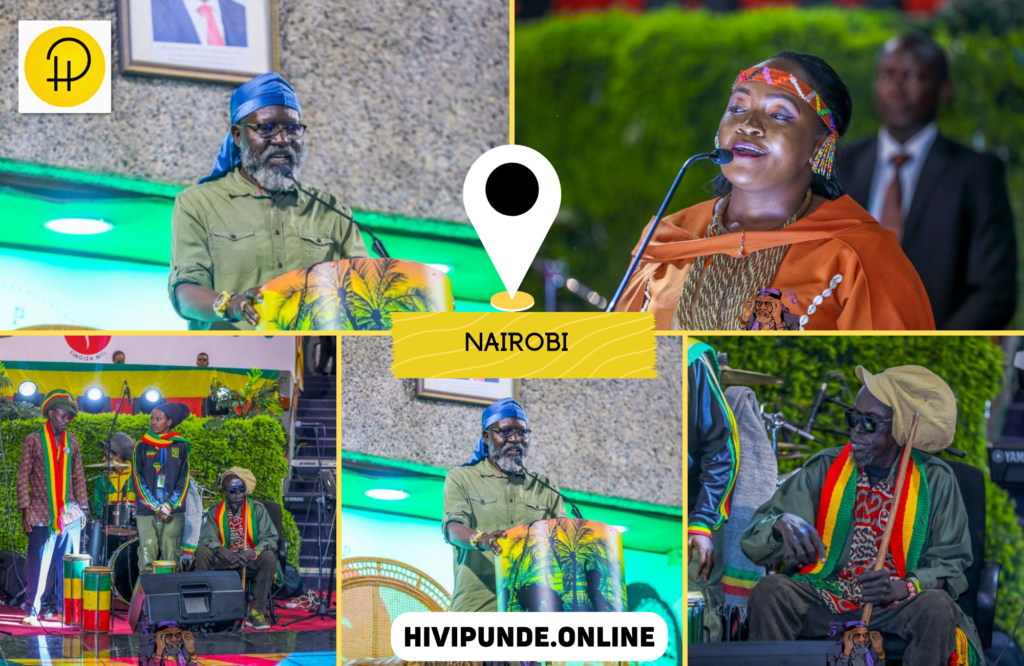I found them.
And Migori was stunning. These people are coming to vote for their country. They own their country and nobody is going to stop Kenyans from choosing their next government from the ballot.
And Migori. Please calm down. That is outstanding support for your Azimio leadership.
Then everything came on.
First it was “Tingiza Mti” Manifesto from Wajackoyah. Then I felt stuff was on. I mean everything.
Roots’ party Presidential candidate George Wajackoyah on Thursday launched his manifesto.
The launch took place at KICC, Nairobi.
The launch, however, took a comical turn after Wajckoya’s presentation of his manifesto was punctuated by his, seemingly, new signature phrase dubbed “Tingiza Mti”
Every moment he delivered his points, the phrase, which was apparently voiced by a woman, was played the moment he paused.

The phrase became an instant sensation on social media generating lots of buzzes.
Kenyans drew mixed reactions to the phrase as some appeared to have been wowed.
Laughing emojis shared on posts about the phrase evidenced the fact that the presentation tickled Kenyans.
Finally, William Ruto delivered his whatever plan.

My first agenda is to defend our Constitution.
For the better part of three years, my opponents subjected us to an absurd process aimed at confusing Kenyans into voting to restore an imperial presidency supported by a court of tribal kingpins who will supervise the judiciary, control the legislature and diminish our bill of rights.
Thankfully, by the grace of God, the courts ended the circus. But we have been promised that reggae will be back. We must ask ourselves whether we want to go from an election into political battles or to focus our energies on getting our economy and development agenda back on track.
It is my firm conviction that our 2010 Constitution is serving us well where we have implemented it, and the challenges that remain are large where we have resisted implementation.
We have resisted the operationalisation of the Judiciary Fund that will give the Judiciary the financial independence and resource it adequately so as to perform its functions effectively.
We have similarly resisted appointing an accounting officer for the Police Service so that the Inspector General of Police and the DCI can do their jobs without fear or favour.
This resistance is not by accident. Its purpose is to retain the control of these institutions by the executive so that the system can be weaponised to fight political opponents and shield allies, business associates and family members.
A system where culpability for crimes depends on what side of the political divide one is on at a point in time, and can be changed by simply crossing over to the correct side is unacceptable.
I intend when elected to empower the Judiciary and the criminal justice system immediately as required by the Constitution.
As your President, I will want neither the power to persecute my political opponents nor the means to shield my allies and friends. It is my solemn pledge to Kenyans that no judge or Inspector General, Director of DCI or Director of Public Prosecutions or any official in the criminal justice system will ever receive a call from William Ruto regarding a matter that is before them.
My second agenda is to institutionalise our politics, which is to say, end the personalisation of political power, and governance generally. This is absolutely critical element of our transition to constitutional democracy and rule of law.
A constitution is the foundational institution of a nation. That said, a constitution is only as good as a political culture. Scholars talk of constitutions without constitutionalism.
It beggars belief that in this day and age, we have leaders among us whose most profound political idea is that our national unity is best promoted by the establishment of a conclave of tribal chiefs.
They have gone further and devised a strange contrivance, alien to democracy, that they call a coalition political party.
But even before the ink has dried on the mysterious coalition agreement, the edifice is already unravelling. Why? Two reasons.
First, to earn a place at the table, one must first emerge as the undisputed kingpin of his community, by finishing all other contenders for the throne.
Second, it is of course also the case that there cannot be a table big enough to accommodate the kingpins of Kenya 40 plus communities.
What has been touted as the panacea for “winner takes all” turns out to be a real-life Game of Thrones?
It is my firm conviction that the unity, stability and prosperity of our country lie not in the greatness of men but in the strength of our institutions.
Our UDA party is founded on the ideology that the national aspirations—justice, peace, freedom, prosperity—that we pray for as we sing our national and them are a covenant that binds us to political inclusion and economic empowerment of all Kenyans.
The people of Kenya do not need patrons and political gatekeepers to represent them at the conclave of tribal chiefs.
What the people of Kenya need are national democratic political parties that enable them to participate fully in decision-making, to hold leaders accountable, and above all to give everyone an equal chance to lead based only on their ability and desire to serve, irrespective of their tribe, gender, physical disability or social background. My third agenda is jobs.
Read: Azimio Manifesto: What is in it for Kenyans
Every year, 800,000 young Kenyans are joining the workforce after completing school, college and university. The corporate sector is only able to employ 50,000 or so.
Another100,000 to 150,000 fortunate ones are able to find stable jobs in successful small businesses.
The others, more than half a million, swell the ranks of frustrated young people eking precarious livelihoods as hawkers, casual labourers and subsistence farmers who hardly produce enough to meet their needs.
The number of these struggling Kenyans now exceeds 10m, more than half the country’s workforce.
People are Kenya’s most important resource.
If half of them are not productive, then it stands to reason that the economy will be like an engine firing only half the cylinders.
Thirty-five years ago, the Government wrote in Sessional Paper No. 1 of 1986, and I quote that “the modern, urban industrial cannot be depended the business sector cannot be depended on to employ much of the growing workforce”.
The paper was emphatic, and I quote again that “limited capital will require that most jobs be created in agriculture and the informal sector.”
It warned that if we did not change our model six million Kenyans would be unemployed by the Year 2000.
That is where we are now, only that we count as employed millions of people who go out every day to try their luck on the streets of our cities and towns.
One day, they bring home Sh100, Sh300 on good days and nothing on bad days.
On very bad days, they are arrested and lose what they would make in a week or more.
We have known for four decades that our economic model is seriously flawed. We have also known that the limited capital available would best be invested in creating jobs in agriculture and in the informal sector— at the bottom of the pyramid.
Four decades on, our economic system continues to be structured in ways that channel capital and other resources to the top of the pyramid, creating immense wealth for the few at the expense of jobs for the many, and prosperity for all.
Yet it is so clear that a rising tide will lift all boats.
It is most disconcerting that even when the consequences of economic exclusion are so glaring, and the threat so palpable, many well-to-do people’s response to our bottom-up economics platform is to pour scorn on the idea of empowering wheelbarrow pushers.
Yet it is so obvious that the rising tide of empowering those at the masses at the base of the economy of the base is not at the expense of those at the top. On the contrary, it is a case of a rising tide lifting all boats.
Allow me to illustrate. If, as we intend to, increase the average daily income of the 10m struggling Kenyans by 200 days, this translates to Sh2b a day, Sh730b a year.
Where will this income end up? The bulk of it will be spent on the basic consumer goods that keep those who are pouring scorn on wheelbarrow pushers employed.
When unemployed university graduates ask us how empowering wheelbarrow pushers will do for them, they miss the obvious fact that the demand for the white-collar jobs they desire is dependent on the size of the market.
Why the disconnect? It suffices to point out that the narrative that the well-to-do are where they are by merit, and the poor where they are because they are less able, is the time-honoured self-serving justification of the status quo in class and caste societies.
For those who lie to themselves thus, tell you this, the wheelbarrow pushers are usable, talented resourceful as you are.
The only reasons our lives have taken different paths are luck or who you know. On 9 August you will be called to choose between two roads.
One leads to constitutional democracy, institutionalised politics and opening the doors of opportunity to the many.
The other takes us back to the imperial presidency, deeper into the personalisation of power, and the inevitable predictable end of economic apartheid that we see so often around the world.
The power is in your hands.
Adongo Ogony is a Human Rights Activist and a Writer who lives in Toronto, Canada









